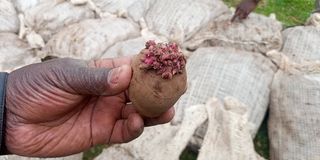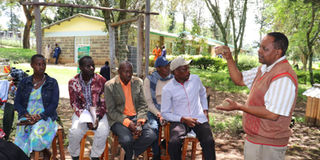Molo and Njoro sub counties lead in uptake of certified potato seeds

A farmer displays a sample of certified potato seeds in Njoro.
Potato production in Nakuru county is a multibillion-shilling enterprise that suffers an acute shortage of seed-clean certified seed.
Certified seed potatoes are seeds that have been certified for purity and are free from disease.
The sector which brings in over Sh. 9.2 billion annually sees farmers growing substandard seed that they have been storing from past harvests making the potato sector less productive and less profitable.

Inside a seed multiplication unit in Njoro.
Thomas Kipng’etich, a potato farmer in Kaplelach- Nyota ward, Kuresoi North sub-county, has been a happy farmer since he transitioned to using certified seed in 2022.
He says, “Initially I rotated seeds together with other farmers in my area, but since getting trained on the importance of using certified seed and seeing the benefits, I’ve never turned back.”
Kipng’etich reveals how his expenses have greatly reduced and his profits increased, as a result.
“I have since reduced my cost of production as previously I sprayed my farm twice a week- now I only spray four times a month as I learned that certified seeds are more resistant to diseases,” he says proudly.
He continues to say how his average production, which was between 20-30 bags per acre has now increased to 98 bags of ware potato (for consumption) and about 50 bags for seed.
Experts such as Prof. Antony Kibe, Professor in Agronomy from Egerton University, posit a positive outlook for the adoption of certified seed by small-holder farmers.

Prof. Anthony Kibe during a training on the value of certified potato seeds in Njoro.
“To bridge the gap on seed scarcity, we are training farmers to be able to produce their seed. Currently, as a country, we can only produce about three percent of certified seed which leaves a 97 percent gap, filled by recycled seed,” he says.
Prof. Kibe further says, “We have also seen about 11 percent of farmers producing their certified seed in the Njoro-Molo area compared to a paltry figure of 2.6 percent witnessed previously, which means they are seeing the importance of buying high-quality seed.”
Despite the sector facing additional challenges like insufficient storage facilities, market glut, low uptake of soil testing by farmers, susceptibility to diseases exacerbated by climate change, and high cost of inputs, Prof. Kibe urges farmers to keep investing in knowledge acquisition by attending farmers training, practicing good agronomic practices, preparing and adapting to the ever-changing climate, ensuring the use of certified seed for improved yields, and having the right market.


